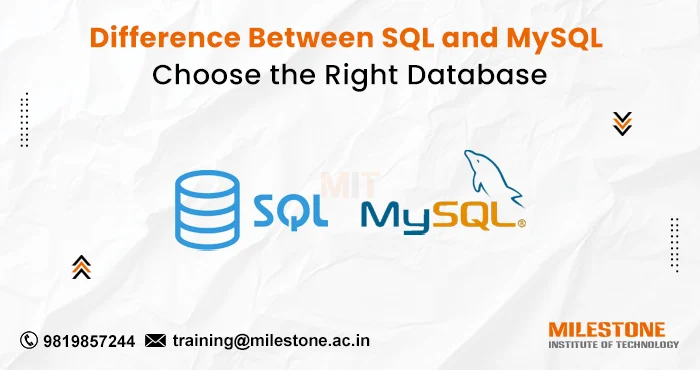There is a huge need for managing databases because of the rise in data usage in the business world. If the data is not analyzed accordingly then it is of no use. Within the domain of database management systems (DMBS), SQL and MySQL are the most well known terms which are frequently used. As per the research and details most of the people get confused between both of this database. In this article, we will deeply understand the “
Difference Between SQL and MySQL” covering overall essential details.
What is SQL?
SQL is developed in 1970s which is a programming language mainly developed for managing relational database management.
SQL offers a uniform interface to databases, this is the reason SQL has become the standard language for database management.
With the help of SQL users can perform many different tasks on databases such as inserting new records, updating records as well as deleting records.and querying data. Users may efficiently manipulate data with SQL by using operations like SELECT, UPDATE, INSERT, DELETE, CREATE, and Drop.
What is MySQL?
SQL is the primary interface used by MySQL’s open-source relational database management system (RDBMS). It is owned by Oracle Corporation in 1995 but developed by MySQL AB. It is a popular choice in web applications because it is easy to use, reliable and scalable.
As an RDBMS,
MySQL arranges data into tables made up of rows and columns, where a record is represented by a row and an attribute by a column. Numerous data types are supported, such as dates, texts, floats, integers, and more. For reliable and effective data management, MySQL additionally offers capabilities like replication, transactions, and indexing.
Understanding the Difference Between SQL and MySQL (SQL vs MySQL)
| SQL |
MySQL |
| SQL (Structured Query Language) is a common language majorly used for managing relational databases. |
MySQL is open source (RDBMS) relational database management system which also uses SQL. |
| SQL provides the syntax and commands for managing and querying relational databases. |
MySQL provides a software platform that includes SQL functionality along with additional features such as replication, clustering, and storage engines. |
| SQL commands are generally standard across different database systems, though there may be some variations. |
MySQL follows SQL standards but may have its own extensions and optimizations. |
| SQL is widely used across various relational database systems such as MySQL, PostgreSQL, SQLite, Oracle, SQL Server, etc. |
MySQL is one of the most popular relational database management systems and is widely used for web development and other applications. |
| SQL itself is typically open standard and free to use. |
MySQL is available for both commercial licenses as well as open-source. |
Applications of SQL and MySQL
Both of these SQL as well as MySQL has various applications across various domains and industries, some of them are mentioned down below :
- Web Development: MySQL is extensively used in web development for managing backend databases of dynamic websites and web applications.
- Enterprise Systems: SQL is commonly employed in enterprise systems for handling large volumes of data and performing complex queries.
- Data Warehousing: MySQL is utilized in data warehousing solutions for storing and analyzing vast amounts of structured data.
- Mobile Applications: SQL databases are integrated into mobile applications to store user data, application settings, and other information.
- E-commerce: MySQL powers many e-commerce platforms, facilitating efficient management of product catalogs, orders, and customer data.
Benefits of SQL and MySQL
SQL Benefits:
- Standardization: SQL provides a standardized way to interact with databases, ensuring compatibility across different database management systems.
- Flexibility: SQL offers flexibility in querying and manipulating data, allowing users to perform complex operations with ease.
- Scalability: SQL databases can scale to handle large volumes of data and concurrent user requests efficiently.
MySQL Benefits:
- Open Source: MySQL is open-source software, allowing users to use, modify, and distribute it freely, making it cost-effective for businesses.
- Performance: MySQL is known for its high performance and speed, making it suitable for demanding applications with large datasets.
- Community Support: MySQL has a vast community of developers and users who contribute to its development, provide support, and share knowledge.
- Compatibility: MySQL is compatible with various operating systems, programming languages, and platforms, ensuring seamless integration with existing infrastructure.
Where Can You Learn SQL and MySQL?
Many of you might be thinking about where to learn SQL and MySQL both, there are many online resources where you can learn basics or grab some knowledge about it. But if you are searching for a proper Institute where you can learn overall
Data Science or SQL and MySQL, then we will suggest Milestone Institute of Technology which provides practical training, placements, best career guidance from expert faculty and certifications. Learning online and offline are two different things but when you want to become pro or gain proper knowledge and skills go with offline training and learning from experts.
Frequently Asked Questions
Is SQL the same as MySQL?
No, both are different MySQL is a (RDBMS) relational database management system that uses SQL as its interface. On the other hand SQL is a programming language used for managing relational databases.
Can I use SQL with MySQL?
Yes, MySQL supports SQL as its primary interface for interacting with databases. SQL commands can be used on MySQL databases to carry out a variety of tasks.
What are the alternatives to MySQL?
If you are searching for an alternative option, there are many which include SQLite, MariaDB, PostgreSQL, and Microsoft SQL Server. But we will suggest you to choose MySQL because it is a better choice between them.
Is MySQL suitable for large-scale applications?
Yes, MySQL is suitable for large-scale applications because of its performance, scalability, and reliability. But if you want optimal performance it actually requires proper optimization and configuration.




